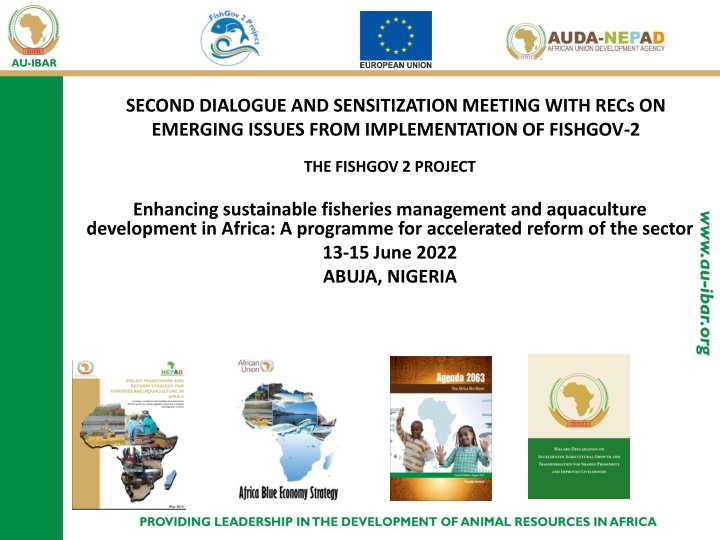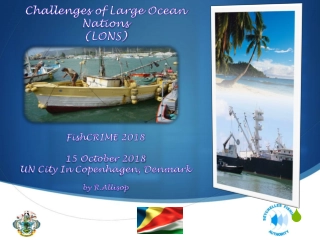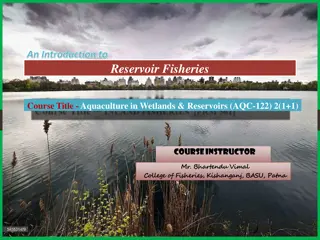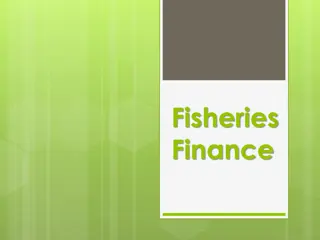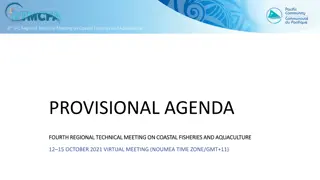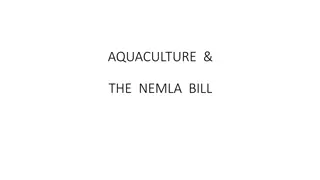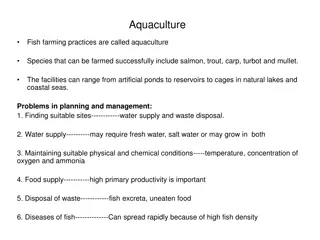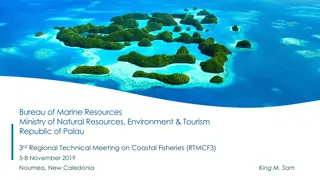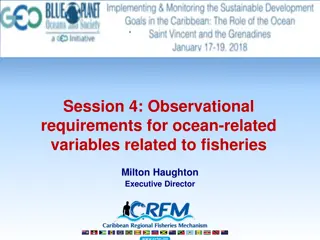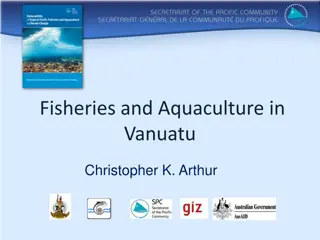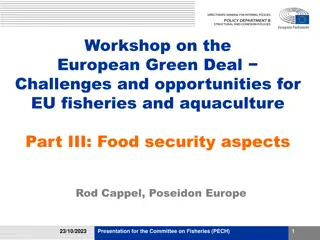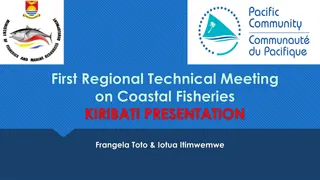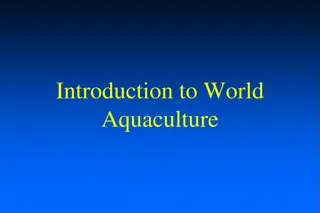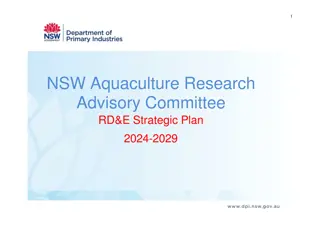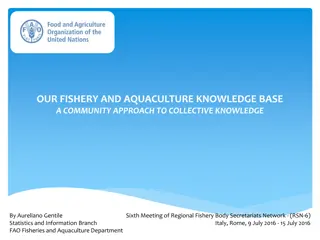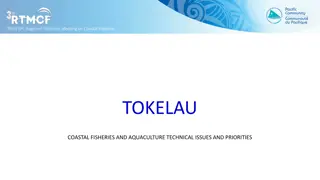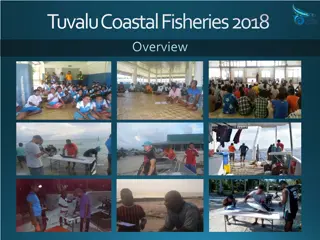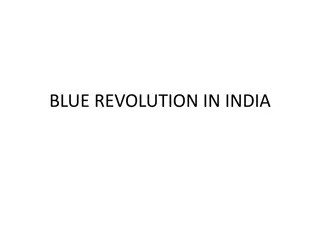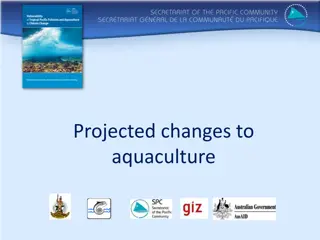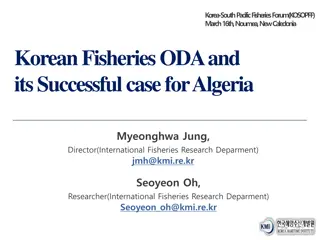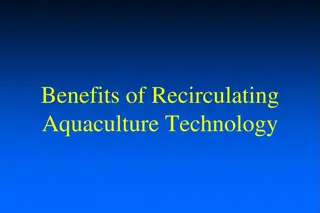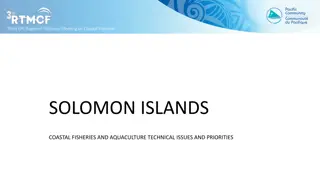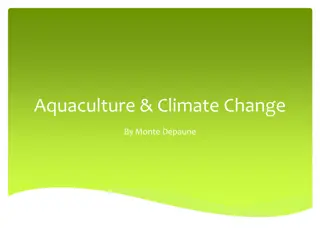Enhancing Sustainable Fisheries Management and Aquaculture Development in Africa: FishGov-2 Project
The FishGov-2 project aims to enhance sustainable fisheries management and aquaculture development in Africa, aligning with AU Agenda 2063. It focuses on evidence-based policies, coordination at different levels, and effective participation in international forums. The project seeks to improve food security, livelihoods, and wealth creation in aquaculture within the AU's framework of sustainable fisheries.
Download Presentation

Please find below an Image/Link to download the presentation.
The content on the website is provided AS IS for your information and personal use only. It may not be sold, licensed, or shared on other websites without obtaining consent from the author.If you encounter any issues during the download, it is possible that the publisher has removed the file from their server.
You are allowed to download the files provided on this website for personal or commercial use, subject to the condition that they are used lawfully. All files are the property of their respective owners.
The content on the website is provided AS IS for your information and personal use only. It may not be sold, licensed, or shared on other websites without obtaining consent from the author.
E N D
Presentation Transcript
SECOND DIALOGUE AND SENSITIZATION MEETING WITH RECs ON EMERGING ISSUES FROM IMPLEMENTATION OF FISHGOV-2 THE FISHGOV 2 PROJECT Enhancing sustainable fisheries management and aquaculture development in Africa: A programme for accelerated reform of the sector 13-15 June 2022 ABUJA, NIGERIA
FISHGOV-2: PROJECT INFORMATION BUDGET: EUR 12,000,000 EU contribution EUR 1,200,000 AU Contribution DURATION: 54 Months, started 1stJanuary 2021 COVERAGE: 55 AU MS and 8 RECs IMPLEMENTATION PARTNER AGENCY: AU-IBAR (contracting authority and coordinating agency) with AUDA-NEPAD as Implementing partner and DARBE as collaborating agency PROJECT TECHNICAL STAFF: 1. Senior Fisheries Officer at AU-IBAR 2. Fisheries and aquaculture resources management expert at AU- IBAR 3. Fish Trade and Investment Officer at AU-IBAR 4. Senior Policy Officer fisheries and aquaculture at DARBE 5. Programme Officer- Fisheries and Aquaculture AUDA-NEPAD 6. Progarmme Assistant Fisheries and Aquaculture - AUDA-NEPAD
PROJECT OBJECTIVES The overall objective of the project is to improve food security, livelihoods and wealth creation aquaculture, aligned with AU Agenda 2063 within the framework of PFRS. in sustainable fisheries and The specific objectives are the following: 1. African Union decisions on sustainable fisheries and aquaculture policies are evidence based 2. Fisheries and aquaculture policies in Africa are coherent with the PFRS and other AU priorities and coordinated at continental, regional and national levels 3. Africa is adequately represented and effectively participates in international fisheries and aquaculture fora and ably domesticates and effectively implements relevant global instruments www.au-ibar.org
RESULT 1: AFRICAN UNION DECISIONS ON SUSTAINABLE FISHERIES AND AQUACULTURE POLICIES ARE EVIDENCE BASED Output 1.1 AU stakeholders have access to quality knowledge products on African fisheries and aquaculture Output 1.2 Existing platforms and networks are reviewed, rationalized and operationalized for effective participation of stakeholders in policy development and implementation Output 1.3 A solid reporting system to STC on the implementation of the PFRS is put in place and integrated into CAADP process Output 1.4 Mechanisms are developed to ensure that sustainable fisheries and aquaculture are mainstreamed in the development of AU policies / initiatives affecting the sector Output 1.5 Advocacy is improved and awareness created about the importance of sustainable fisheries and aquaculture www.au-ibar.org
RESULT 2: FISHERIES AND AQUACULTURE POLICIES IN AFRICA ARE COHERENT WITH THE PFRS AND COORDINATED AT CONTINENTAL, REGIONAL AND NATIONAL LEVELS Output 2.1 Capacities and systems for regional collaboration and integration regarding shared fisheries and aquaculture resources management are improved and linkages with environmental governance frameworks are enhanced Output 2.2 Capacities of Member States, RECs and RFBs to develop realistic sustainable fisheries and aquaculture policies in coherence with the PFRS are strengthened Output 2.3 Capacities are strengthened to facilitate intra and inter regional fish trade in line with the regional integration trade agenda and the Protocol on Trade in Goods of the Africa Continental Free Trade Area www.au-ibar.org
RESULT 3: AFRICA IS ADEQUATELY REPRESENTED AND EFFECTIVELY PARTICIPATES IN INTERNATIONAL FISHERIES AND AQUACULTURE FORA AND ABLY DOMESTICATES RELEVANT GLOBAL INSTRUMENTS Output 3.1 Capacities of AU Member States including SIDS - in terms of international negotiations are increased and a mechanism is put in place to coordinate African common positions Output 3.2 Mechanisms are put in place to encourage and facilitate the domestication of global instruments and initiatives at continental, regional and national levels Output 3.3 Capacities of AU Member States are strengthened to effectively articulate African positions on fisheries and aquaculture in the AU-EU dialogue www.au-ibar.org
PROJECT STRUCTURE Project Technical Coordinating Committee meeting Project Steering Committee meeting Inception www.au-ibar.org
SO1: African Union decisions on sustainable fisheries and aquaculture policies are evidence based. Output 1 1: AU stakeholders have access to quality knowledge products on African fisheries and aquaculture 1.1:1. Collect and centralize information and research relating to fisheries and aquaculture in Africa as a repository within AU institutions and establish a mechanism for regular updating; the use of database 1.1.1.1. Develop and update database on fisheries and aquaculture and develop mechanism for data management. 1.1.1.2. Commission studies on identifications of sources of fisheries, aquaculture, socio-economics and environmental related data (research and statistics) in 5 regions (West, Central, East, South and North) 1.1.1.3. Conduct five regional trainings for member states on 1.1.2. Conduct policy oriented studies to address social, economic and environmental challenges on fisheries and aquaculture in Africa (e.g. on the state of the stocks, economic valuation of aquatic and coastal goods and services, impact of climate change etc). 1.1.2.1. Collect existing relevant information in AU MS and institutions on the state of fish stocks in regions. 1.1.2.2. Conduct economic valuation of ecosystem goods and services, impact of climate change on fisheries and aquaculture. 1.1.2.3. Conduct a write shop of experts (mainly from AFRM WGs) to utilize the outputs from 1.1.2.1 and 1.1.2.2 in the www.au-ibar.org production of the biennial Africa Fisheries and Aquaculture report , relevant policy briefs and information notes.
SO1: African Union decisions on sustainable fisheries and aquaculture policies are evidence based. Output 1 1: AU stakeholders have access to quality knowledge products on African fisheries and aquaculture 1.1.3. Update the AU-FAO study on the Value of African fisheries (2014); for updating the AU-FAO study on the value of Africa fisheries 2014. 1.1.3.2. Train AU MS on methodology and approach of data collection and analysis 1.1.3.3. Conduct an experts' workshop to validate the updated study 1.1.4. Produce foresight studies and relevant fisheries and aquaculture contributions to ongoing thematic processes and initiatives (i.e. on food and nutrition security, gender, marine biodiversity and ecosystems, climate change, blue economy etc) foresight studies including Ocean Governance and facilitate relevant workshops. 1.1.5. Document lessons learnt and best practices for informed and rational interventions; informed and rational interventions. 1.1.3.1. Develop methodology, template and training manuals 1.1.4.1 Conduct foresight studies to inform policy reforms on relevant fisheries and aquaculture issues - diverse consultancies to address issues above. 1.1.4.2. Conduct an experts' workshop to validate the foresight studies. 1.1.4.3. Prepare materials to address all identified issues in the 1.1.5.1. Document lessons learnt and best practices on current and emerging fisheries and aquaculture related issues for www.au-ibar.org 1.1.6.1. Identify issues and prepare position papers, advocacy notes and policy briefs through a consultative meeting with stakeholders within the AFRM forum. 1.1.6. Prepare and present position, advocacy papers and policy briefs on fisheries and aquaculture related issues.
SO1: African Union decisions on sustainable fisheries and aquaculture policies are evidence based. Output 1.2 Existing platforms and networks are reviewed, rationalized and operationalized for effective participation of stakeholders in policy development and implementation 1.2.1. Conduct a functional review of existing platforms and networks in relation to PFRS and AFRM (e.g. AFRIPAAS, AWFISHNET, Policy Research Network etc); anchorage with RECs and relevant RFOs. 1.2.1.2 Conduct a continental stakeholders consultative workshop to validate the above review and chart the wayforward on rationalization and anchorage. 1.2.1.1. Review and propose mechanisms for rationalization of existing fisheries and aquaculture platforms and networks and propose a framework for 1.2.2. Support rationalization of existing platforms and networks, ensure institutional anchorage at relevant level, enhance their capacities and use them to implement identified activities / pilot projects; 1.2.2.1. Conduct workshops to train rationalized platforms/networks to operationalize anchorage and enhance capacities on implementation of approved workplans and policy. 1.2.2.2. Purchase equipment as may be required by COEs or other specialized institutions for effective implementation of activities related to the Action. 1.2.2.3 Conduct assessment and review for selection of additional centres of excellence in relevant disciplines in fisheries and aquaculture; in line with 2019 STC ARDWE www.au-ibar.org recommendations.
SO1: African Union decisions on sustainable fisheries and aquaculture policies are evidence based. Output 1.2 Existing platforms and networks are reviewed, rationalized and operationalized for effective participation of stakeholders in policy development and implementation 1.2.3 Develop cost effective mechanisms for stakeholder consultation. consultation mechanism for stakeholders consultation and generate specific recommendations based on best practices. 1.2.3.2. Convene an experts' validation workshop to review the recommendations on cost-effective consultation and develop a roadmap for cost-effective implementation. 1.2.3.3. Train selected AU MS and RECs on the approved methodology for effective communication. 1.2.4. Simplify and operationalize the AFRM. for the various organs of the AFRM in line with the third STC-ARDWE recommendation. 1.2.4.2. Facilitate meetings of the revised WGs on formulation of experts' inputs on emerging issues in fisheries and aquaculture. 1.2.4.3. Facilitate the establishment of the advisory council of the revised AFRM. 1.2.3.1 Commission a study to develop a cost effective 1.2.4.1. Organize a consultative workshop to revise TORs www.au-ibar.org
SO1: African Union decisions on sustainable fisheries and aquaculture policies are evidence based. Output 1.3 A solid reporting system to STC on the implementation of the PFRS is put in place and integrated to CAADP process. 1.3.1. Develop indicators to monitor the implementation of PFRS in line with the Malabo goals. implementation. 1.3.1.2.Conduct an experts' consultative workshop to validate the developed M&E system and performance indicators. 1.3.2. Produce annual snapshot of fisheries and aquaculture performance reports based on these indicators 1.3.3. Contribute to the biennial review of Malabo goals for monitoring progress of implementation of AU decisions; 1.3.4. Actively contribute to the agenda of STC meetings, based on strategic planning and support the organization of biennial African ministerial dialogue on Fisheries and aquaculture. ministerial sessions to, among others, review the experts' recommendations 1.3.1.1 Develop and propose mechanisms for operationalization of a robust M&E systems based on PFRS guidelines for monitoring PFRS 1.3.2.1. Prepare and compile biennial status report that would contribute to the Africa fisheries and aquaculture report for year 1 1.3.3.1. Facilitate the participation of national, regional representatives and AFRM experts in CAADP biennial review processes to integrate fisheries and aquaculture in the biennial CAADP report on Malabo Goals and Targets 1.3.4.2 Prepare documentations for 3 STCs and high level AU policy organs. 1.3.4.3. Facilitate the participation of experts in STC expert session's meetings to develop recommendations for the STC-ARDWE. 1.3.4.4. Facilitate the participation of relevant officials in STC www.au-ibar.org
SO1: African Union decisions on sustainable fisheries and aquaculture policies are evidence based. Output 1.4 Mechanisms are developed to ensure that sustainable fisheries and aquaculture are mainstreamed in the development of AU policies / initiatives affecting the sector. 1.4.1. Map initiatives that are underway or planned at the AU that are relevant to fisheries and aquaculture and contribute to their development / implementation by providing relevant input. Build synergies and support alignment among these different sectors; 1.4.1.1. Organize internal virtual meeting among AUC Departments to map initiatives that are underway or planned at the AU which are relevant to fisheries and aquaculture, for synergistic implementation of activities that relevant to fisheries and aquaculture (e.g. blue economy, maritime security, environmental protection and ocean governance) 1.4.2. Engage with non-fisheries and aquaculture actors (e.g. ministers in charge of finance, trade, planning, financial institutions etc); 1.4.2.1. Organize internal virtual and physical meetings to develop and operationalize a framework for internal coordination of fisheries and aquaculture among relevant AUC Actors 1.4.3.1. Organize internal virtual (and Physical meetings) to develop and operationalize a framework for internal coordination of fisheries and aquaculture among relevant AUC 1.4.3. Associate relevant AU services to activities developed under this Action www.au-ibar.org Actors
SO1: African Union decisions on sustainable fisheries and aquaculture policies are evidence based. Output 1.5 Advocacy is improved and awareness created about the importance of sustainable fisheries and aquaculture. 1.5.1. Develop and operationalize an effective communication and advocacy strategy, in collaboration with competent AU services; 1.5.1.1. Develop an effective communication plan and advocacy strategy. 1.5.2. Strengthen communication and advocacy capacities in AUC, AU-IBAR and AUDA-NEPAD. 1.5.2.1. Organize a meeting to establish a mechanism for implementation of the communication plan and advocacy strategy within relevant AU offices and other implementing institutions (RECs, RFBs and COEs). 1.5.3. Draft and disseminate materials, internally and externally, in different languages; 1.5.3.1 Produce knowledge products on fisheries and aquaculture related issues, including development of documentary (electronic, video). 1.5.3.2 Translate, print and disseminate knowledge products, including the Africa fisheries and aquaculture reports. 1.5.4. Develop and operationalize dedicated fisheries and aquaculture portals in support to the Action s activities. 1.5.4.1. Review and/or establish mechanisms for updating existing websites and visibility; within 10 regional institutions (5 RECS, 5 RFBs) 1.5.4.2. Review and/or establish mechanisms for updating existing websites and visibility; within AUC, AU-IBAR and AUDA-NEPAD. www.au-ibar.org
SO2 Fisheries and aquaculture policies in Africa are coherent with the PFRS and coordinated at continental, regional and national levels in order to maintain healthy and resilient marine, coastal and freshwater ecosystems in the context of climate change. Output 2.1 Capacities and systems for regional collaboration and integration regarding shared fisheries and aquaculture resources management are improved and linkages with environmental governance frameworks are enhanced . 2.1.1. Facilitate coordination among regional organizations (RECs, RFB and RSC) through regular exchange of information between the APRIFAAS members. implementation and enhanced coordination. 2.1.2. Ensure cross-regional/trans-regional coherence of RECs and RFBs strategies and facilitate their institutional anchorage, in line with the PFRS. anchorage. 2.1.2.2. Validate and operationalize the framework for effective anchorage between RECs, RFBs and RSCs. 2.1.3. Identify mechanisms for establishing / strengthening linkages between regional organizations in charge of fisheries management (RFMOs/RFBs) and regional organizations in charge of environmental issues (RSC and inland water bodies). establishing/strengthening linkages between specialized regional fisheries institutions and environmental 2.1.1.1.Conduct bi-annual consultative meetings to exchange information, review and align workplans within the framework of AFRM for synergistic 2.1.2.1. Collect best practices and lessons learnt on functional institutional anchorage between RECs and RFBs/RSC and propose a framework for effective 2.1.3.1. Develop a mechanism for establishing/strengthening linkages between specialized regional fisheries institutions and environmental agencies. 2.1.3.2. Validate and operationalize the mechanism for www.au-ibar.org agencies.
SO2 Fisheries and aquaculture policies in Africa are coherent with the PFRS and coordinated at continental, regional and national levels in order to maintain healthy and resilient marine, coastal and freshwater ecosystems in the context of climate change. Output 2.2 Capacities of Member States, RECs and RFBs to develop realistic sustainable fisheries and aquaculture policies in coherence with the PFRS are strengthened. 2.2.1. Develop capacities and provide technical support to Member states and RECs to develop sectoral strategies and investment plans 2.2.2. Support member States in reviewing their policies and legislations and aligning them with best international practices (and existing continental / regional instruments) 2.2.1.1. Conduct studies to establish which AU MS have sectoral strategies and investment plans and develop a mechanism for twinning between those with and those without in 5 regions 2,2,2,1 Review and align national fisheries and aquaculture polices and laws with the PFRS, regional instruments and global best practices for 15 AU member states 2.2.2.2. Facilitate national validation workshop for reviewed national policies and laws at Member States level. 2.2.3. Mainstream sustainable and climate-resilient fisheries and aquaculture in NAIPS, RAIPs and other Investment programmes. 2.2.3.1. Review national and regional fisheries-aquaculture plans to mainstream sustainable and climate-resilient, environmentally sustainable fisheries and aquaculture, in NAIPS, RAIPs and other Investment programmes. 2.2.3.2 Conduct national consultative workshops to validate the outcomes of the above review in 15 AU member states 2.2.3.3. Conduct regional consultative workshops to validate the outcomes of the above review (5 RECs). 2.2.4.1. Develop training materials and facilitate a training workshop on the design of fisheries and aquaculture strategies for implementation at national and regional levels. 2.2.4. Facilitate stakeholders consultation on the design and implementation of national and regional strategies www.au-ibar.org 2.2.4.2. Facilitate the participation of relevant stakeholders in capacity building workshop on the design and implementation of national and regional strategies.
SO2 Fisheries and aquaculture policies in Africa are coherent with the PFRS and coordinated at continental, regional and national levels in order to maintain healthy and resilient marine, coastal and freshwater ecosystems in the context of climate change. Output 2.3 Capacities are strengthened to facilitate intra and inter regional fish trade in line with the regional integration trade agenda and the Protocol on Trade in Goods of the Africa Continental Free Trade Area 2.3.1. Identify strategic regional value chains for sustainable fisheries and aquaculture regional value chains for sustainable fisheries and aquaculture 2.3.2.1. Convene a consultation process to validate the identified strategic regional value chains for sustainable fisheries and aquaculture for implementation. strategic regional value chains; 2.3.3. Support regional approaches for the establishment of regional reference laboratories and diagnostic networks; and recommend mechanisms for establishing regional reference laboratories and diagnostic networks for fish and fish products. The consultancy should also entail assessment of capacities for other certification processes for enhanced market access. 2.3.3.2. Convene an experts' consultative workshop to validate the recommended regional mechanisms for 2.3.1.1 Hire COEs to conduct studies in West_Central, East_Southern and Northern regions to identify strategic 2.3.2. Support RECs and their Member States in reviewing their trade and SPS policies to facilitate fish trade along those 2.3.3.1. Conduct institutional assessment of laboratories and diagnostics networks in the various regions of Africa www.au-ibar.org establishing regional reference laboratories and diagnostic networks.
SO2 Fisheries and aquaculture policies in Africa are coherent with the PFRS and coordinated at continental, regional and national levels in order to maintain healthy and resilient marine, coastal and freshwater ecosystems in the context of climate change. Output 2.3 Capacities are strengthened to facilitate intra and inter regional fish trade in line with the regional integration trade agenda and the Protocol on Trade in Goods of the Africa Continental Free Trade Area 2.3.4. Enhance the capacity of fisheries and aquaculture traders with due consideration for small scale traders and women engaged in fish trade an processing; traders network (AWfishNet) on policy dialogue, governance, leadership, advocacy, effective networking, communication and organizational skills. 2.3.4.3. Organize national workshops to facilitate establishment of national chapters for Awfishnet in fragile states (15 AU MS) towards strengthening effective engagement in decision making at national levels on issues relating to fisheries and aquaculture. 2.3.4.1. Develop an advocacy strategy and mechanism for effective participation of women and youth fish traders in fisheries and aquaculture policy dialogue and networking. 2.3.4.2. Train members of the African women fish processors and 2.3.5. Improve aquatic disease outbreak detection, notification and support coordinated response. 2.3.5.1.Develop Guidelines to strengthen diagnostic capacities of competent national authorities and networks on aquatic animal disease detection, surveillance and coordinated responses, based on OIE Aquatic Animal Health Code and Manual of Diagnostic Tests for Aquatic Animals (this activity includes stakeholder's participation in a virtual meeting to validate the guidelines). 2.3.5.2. Train regional aquatic animal health networks on the use of www.au-ibar.org the Guidelines on aquatic animal disease detection, surveillance and coordinated responses.
SO3. Africa is adequately represented and effectively participates in international fisheries and aquaculture fora and ably domesticates relevant global instruments. Output 3.1 Capacities of AU Member States including SIDS - in terms of international negotiations are increased and a mechanism is put in place to coordinate African common positions. 3.1.1.1. Convene annual expert's meetings to identify specific and emerging issues and draft common positions for deliberation and adoption at relevant fora. 3.1.1.2. Convene annual consultative virtual workshops to validate draft common positions - for 55 AUMS and 8 RECs. 3.1.2.1. Identify specific issues relevant to SIDs and develop draft strategic positions and make specific recommendations for establishment/strengthening a platform of SIDS. 3.1.2.2 Convene a virtual consultative workshop to validate draft strategic position and the recommendations for establishment of a platform of SIDs 3.1.2.3. Operationalize the platform of SIDS to address specific issues and needs of SIDS and develop subsequent strategic positions. 3.1.3.1.Prepare a roster of fishery and aquaculture experts in the different Member States and set up a consultation mechanism to draft positions and mobilize technical expertise 3.1.3.2. Conduct a virtual workshop involving AU member states on identification of issues and formulation of common positions. 3.1.4.1. Identify global issues and agendas which impact on national, regional and continental fisheries and aquaculture development. 3.1.4.2. Conduct an expert consultative training workshop on negotiation skills. 3.1.4.3. Present and advocate for African common positions at relevant fora. 3.1.5.1. Convene side events with the African Group of ambassadors and negotiators to agree on African common positions to be presented at relevant fora. 3.1.6.1. Assist AU policy organs representatives to attend relevant high level events to enhance visibility of African fisheries and aquaculture. 3.1.1. Identify specific issues / events on which it is relevant to develop an African voice and plan adequately preparatory work; 3.1.2. Identify specific needs of African SIDS and take them into account in strategic positions in international fora 3.1.3. Identify expertise in the different Member States and set up a consultation mechanism to prepare positions; 3.1.4. Increase capacities on international issues and organize specific trainings for pre-identified negotiators; 3.1.5. Prepare African common positions using AU processes; 3.1.6. Assist AU policy organs in the identification and participation of African champions (HSG and Ministers) in relevant High level events, enhancing visibility of the African voice www.au-ibar.org
SO3. Africa is adequately represented and effectively participates in international fisheries and aquaculture fora and ably domesticates relevant global instruments. Output 3.2 Mechanisms are put in place to encourage and facilitate the domestication of global instruments and initiatives at continental, regional and national levels 3.2.1. Identify a list of priority instruments and initiatives (e.g. PSMA, CCRF, SSF-VG, CITES, CBD etc) 3.2.1.1. Identify and analyze priority instruments and initiatives and outline strategies for effective participation by AU member states. 3.2.1.2. Conduct a continental stakeholders' consultation to validate the list of priority instruments and initiatives and the proposed strategies for effective participation and implementation. 3.2.2.1. Develop a mechanism for follow-up on implementation and ratification of relevant instruments by AU MS for biennial reporting progress of domestication, including instruments relating to combating IUU (e.g. PSMA, EU-IUU regulations). 3.2.2.2 Conduct an experts' consultative workshop to review the framework for monitoring progress of implementation of global instruments. 3.2.2.3. Convene a virtual consultative meeting with AU MS and RECs to validate. 3.2.2.4. Conduct a review of national policies in 15 AU MS and make specific recommendations for alignment and domestication of global instruments. 3.2.2.5 Within the framework of AFRM generate specific recommendations for regular reporting on status of domestication. 3.2.2. Establish and regularly update their state of ratification and domestication www.au-ibar.org
SO3. Africa is adequately represented and effectively participates in international fisheries and aquaculture fora and ably domesticates relevant global instruments. Output 3.2 Mechanisms are put in place to encourage and facilitate the domestication of global instruments and initiatives at continental, regional and national levels 3.2.3. Develop inputs for the STCs and high level AU policy organs 3.2.3.1. Prepare meeting documents for STC and high level AU Policy Organs; STC meetings thrice in 4 years (AU-IBAR, AUDA- NEPAD, DREA). 3.2.3.2. Organize internal meetings to prepare issues for presentation to STCs and other High Level Policy meetings: (AU- IBAR, DREA, OLC (AU office of Legal Counsel) and other relevant AUC departments and STC-ARDWE Bureau; 3.2.4.1 Convene regular dialogue meetings and sensitization with RECs on emerging issues of the Action. 3.2.5.1.Establish and operationalize a biennial forum for regular consultations on monitoring compliance on domestications of global and continental instruments within the framework of AFRM. 3.2.4. Support dialogue and sensitization at RECs level 3.2.5. Identify mechanisms supporting developing countries involvement and compliance and promote their use by AU member States 3.3.1. Collect information on relevant EU initiatives (Alliance for Sustainable Investment and Jobs, EIP etc); 3.3.2. Engage in a regular sectoral dialogue with European 3.3.1.1. Prepare materials on relevant EU initiatives and make appropriate recommendations to AU MS for articulation of coherent African positions during AU-EU dialogue. www.au-ibar.org 3.3.2.1. Organize virtual dialogue meetings with EU (once a year) to identify issues of common interest in fisheries and aquaculture.
SO3. Africa is adequately represented and effectively participates in international fisheries and aquaculture fora and ably domesticates relevant global instruments. Output 3.3 Capacities of AU Member States are strengthened to effectively articulate African positions on fisheries and aquaculture in the AU-EU dialogue 3.3.1. Collect information on relevant EU initiatives (Alliance for Sustainable Investment and Jobs, EIP etc); 3.3.2. Engage in a regular sectoral dialogue with European Commission services and identify issues of common interest; 3.3.1.1. Prepare materials on relevant EU initiatives and make appropriate recommendations to AU MS for articulation of coherent African positions during AU-EU dialogue. 3.3.2.1. Organize virtual dialogue meetings with EU (once a year) to identify issues of common interest in fisheries and aquaculture. 3.3.3. Prepare technical inputs to relevant AU bodies in view of AU- EU summits; 3.3.3.1. Organize internal virtual AU meetings to agree on relevant technical inputs and prepare materials for inputs into relevant AU bodies. 3.3.4. Consider the organization of joint technical events or the development of common positions at global level. 3.3.4.1. Organize virtual joint technical events to develop common on global issues annually. www.au-ibar.org
IMPLEMENTATION MECHANISM The African Union Inter-African Bureau for Animal Resources (AU-IBAR) is responsible for overall management and coordination of the project. The implementation partner is AUDA-NEPAD; A Sub-delegation agreement between AU-IBAR and AUDA-NEPAD signed in which details on the activities to be implemented by the AUDA-NEPAD are be provided The established a project coordinating committee, to ensure coherence in the implementation of activities by the implementing partners and decision informed decision making by the PSCs. This committee comprises of Project implementing partners, AU MS, RECs etc. A Project Steering Committee (PSC), was established to oversee and provide strategic guidance to the overall direction and policy of the project An inception meeting was organized to herald project implementation, apprised stakeholders on project activities and solicit inputs on priorities. www.au-ibar.org
SUSTAINABILITY MECHANISMS The successful accomplishment of the project would result in evidence-based decision making with regards to fisheries and aquaculture by policy organs of the African Union. The source of high-quality data would also be available to the stakeholders in the fisheries and aquaculture sector, including AU member states, RECs, RFBs etc for sustainable governance of the sector. - Coordination and institutional collaboration would be enhanced and broadened between regional institutions to include RECS, RFBs, RSC and RFMOs, WBC. This would result in synergies in the governance of the sector especially at regional levels for sustainable management of shared fish stocks. - Improved governance of the fishery and aquaculture sectors would be ensured through fostering policy coherence, accountability as well as ratification and adoption of international best practices and global instruments by AU member states and RECs. - Sustainable exploitation of fish stocks and responsible aquaculture practices would improve through capacity building in fisheries management approaches or tools and aquaculture practices by provisions of policy briefs, advocacy notes, access to quality data and information and foresight studies. - www.au-ibar.org
SUSTAINABILITY MECHANISMS CONT Improved governance and management practices would impact on increased contribution of the sector to GDP, economic growth, food security and livelihoods and social welfare, food safety, including employment, in the long-time. - Participatory, inclusive approaches and transparency in the governance of the sector would be enhanced through active, effective and coordinated stakeholders (the NSAs platforms, AWFISHNET, MOSFA, ANAF, PRNFAA) - The visibility of the importance of the sector in national development, food security, and social cohesion would be increased and public sector support or allocation enhanced through establishment of the culture of engagement and consultation between the fisheries and aquaculture sector with other sectors such as finance, public health, trade, judiciary, foreign affairs ministries or departments at member states level. - Increased recognition of African fisheries and aquaculture in global fora through effective coherent African voice - Enhanced partnership and coordination between African Union and European Union on sustainable fisheries and aquaculture development - www.au-ibar.org
Thank You AU-IBAR: Providing leadership in the development of animal resources for Africa
